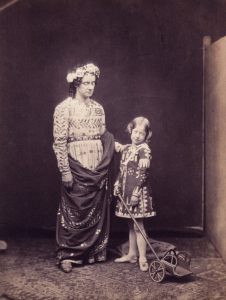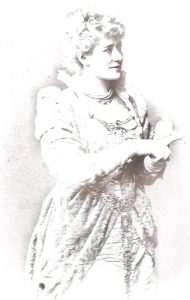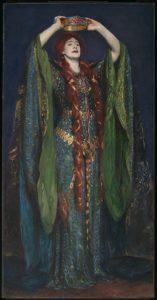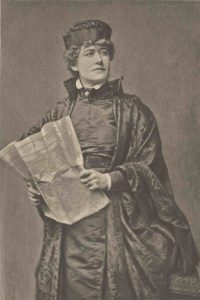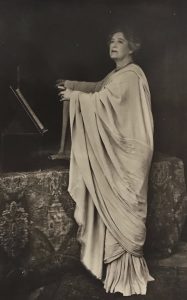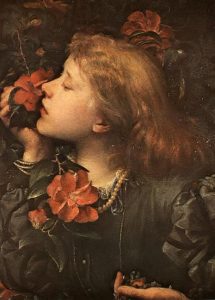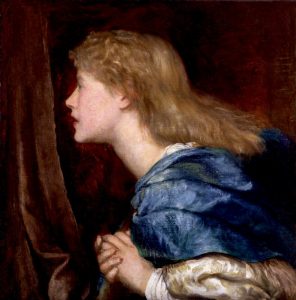THE INCREDIBLE ELLEN TERRY
“It has often been remarked that Ellen Terry spoke the language of Shakespeare as if it were her native tongue, and in these communings with herself there is revealed something of the process by which she arrived at that state of grace in which his words became her words.”
From Christopher St. John’s introduction to Ellen Terry’s Four Lectures on Shakespeare
In honor of Women’s History Month, we’re celebrating the unconventional life of the incredible Dame Alice Ellen Terry GBE, known professionally as Ellen Terry, one of the first stars of the modern British stage. With a performing career that lasted almost seventy years, she is considered one of the greatest stage actresses of the 19th and early 20th centuries in both the United Kingdom and the United States. She is particularly remembered for her artistic partnership with the actor Henry Irving with whom she performed and toured numerous productions of Shakespeare over a span of twenty years, and for her lectures about Shakespeare and performance which she also toured across Great Britain and the United States.
Ellen the Actress
Born in England in 1847 to a moderately successful family of traveling actors (progenitors of a theatrical dynasty whose descendants included Sir John Gielgud), Ellen followed her parents onto the stage at a young age. She was performing Shakespeare in London by age 9, appearing as King Leonte’s son Mamillius in a production of The Winter’s Tale at the Princess’s Theatre, receiving positive notices from critics despite reportedly tripping during the opening night performance.
Ellen continued to perform in London and tour the provinces into her teens, playing Shakespearean roles as well as contemporary parts. At 15, she appeared as Titania in A Midsummer Night’s Dream at the reopening of the Theatre Royal, Bath. A few days shy of her 17th birthday, she married the painter George Frederic Watts and retired from the stage for a brief time but left less than a year into the marriage. Ellen returned to acting briefly before entering a relationship with famed architect and designer Edward William Godwin after which retired from the stage to raise their family. After six years, Ellen returned to the stage once more, quickly becoming one of the most important and sought-after actresses in London.
In 1878, at age 30, Ellen began a professional partnership with the actor and producer Henry Irving that would cement her place as Britain’s most famous actress. She became the lead actress for his company at the Lyceum Theatre and the two played opposite each other for more than 20 years (until 1902) in productions of Shakespeare as well as contemporary plays. She was paid a staggering amount for her work with Irving: some weeks, such as when she was on tour in America, she earned £200 per week (the equivalent of £24,000 today) . Ellen was particularly celebrated for her Shakespearean roles, including Portia, Desdemona, Cordelia, Lady Macbeth, Imogen and Queen Katherine.
Ellen inspired another Irish playwright, George Bernard Shaw, with whom she began a famous correspondence in the 1890s. Though they never met, Ellen performed in and produced Shaw’s work at the Imperial Theatre, which she took over in 1902, and on tour across the United States.
As she grew older and increasingly had difficulty securing leading roles, Ellen began to give lectures on Shakespeare that proved almost as popular as her acting work. She was able to take these on tour across the UK, the United States, Australia, and New Zealand.
She retired in 1922 at age 75 having worked on the stage until 1920 and even appeared in a few early films. She is the second actress ever to be awarded the Dame Grand Cross of the Order of the British Empire for her performance work. Ellen died in 1928 at her home, Smallhythe Place.
The Many Marriages of Ellen Terry
Ellen’s first marriage was to the symbolist painter George Frederic Watts who was thirty years her senior. While married to Watts, Ellen sometimes modeled for her husband and is the subject of several of his paintings:
The marriage was short and Ellen left after less than a year. Watts offered her an allowance conditioned on her remaining away from the theatre but she did not stay off the stage for long.
After a brief return, Ellen again retired from the stage to be with Edward William Godwin. They could not marry as she was still legally married to Watts but they had two children together (a cause for great scandal at that time): Edith and Edward, both of whom would become prominent figures in British theatre. Terry and Godwin stayed together for more than six years while Ellen raised the children. Though the relationship deteriorated and Ellen returned to the stage once more in 1874 Godwin continued to design her costumes for several years.
Ellen married a third time, having eventually secured a divorce, in 1887, but the marriage only lasted a few years.
She married for a fourth and final time during one of her American tours, of Shaw’s Captain Brassbound’s Conversion. While in Pittsburgh, she married her co-star James Carew, an American actor who was thirty years her junior. (You can read a PDF copy of the announcement, found in a copy of her lectures by Dean Eunice Roberts.) While they remained married for the rest of Ellen’s life, they separated after two years.
Throughout all of Ellen’s numerous relationships and marriages, one thing remained constant: at the end of each relationship, she’d return once more to the stage (and to acclaim).
Of her unconventional personal life, Ellen is quoted as having said “Shakespeare, the only man I ever really loved.”
In addition to her incredible theatrical family (descendants of the Terry dynasty include Sir John Gielgud and others who continued to perform on the London stage well into the twenty-first century), her daughter Edy ( a prominent producer, designer, director and early suffragette) and son Edward (a theatre actor, designer, and director), Ellen left behind her Four Lectures on Shakespeare which were collected and published after her death.
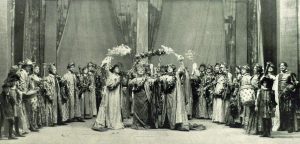
Marion, Kate and Ellen Terry (centre), surrounded by other members of the Terry theatrical dynasty at Ellen’s Jubilee matinée, Drury Lane, 12 June 1906
More about Ellen Terry:
- British Heritage Travel’s feature on Ellen Terry
- Ellen Terry’s home, Smallhythe Place, now houses her theatrical collection and The Barn Theatre performance space. Her daughter, Edy, opened the home to the public shortly after Ellen’s death as a memorial to her mother. Edy converted a barn on the property into a theatre where performances of Shakespeare are given annually to honor Ellen’s birthday. In 1947, Edy convinced a number of theatrical luminaries to perform and mark the 100th anniversary of her birth, including Ellen’s great-nephew John Gielgud, Edith Evans, and BADA’s first Patron Peggy Ashcroft.
- Ellen’s performance of Portia inspired Oscar Wilde to write a sonnet in her honor, which he sent to her with the message: “No actress has ever affected me as you have. I do not think you will ever have a more sincere an impassioned admirer than I am.”:
Portia (To Ellen Terry)
I marvel not Bassanio was so bold
To peril all he had upon the lead,
Or that proud Aragon bent low his head
Or that Morocco’s fiery heart grew cold:
For in that gorgeous dress of beaten gold
Which is more golden than the golden sun
No woman Veronese looked upon
Was half so fair as thou whom I behold.
Yet fairer when with wisdom as your shield
The sober-suited lawyer’s gown you donned,
And would not let the laws of Venice yield
Antonio’s heart to that accursed Jew –
O Portia! take my heart: it is thy due:
I think I will not quarrel with the Bond. - While in the US in the early 1910s, Ellen was hired by the Victor Talking Machine Company to record some of Shakespeare’s speeches, recordings of which are still around to this day. Many of the recordings are available here. Click here for a cleaned-up recording of Ellen Terry reciting “The Quality of Mercy”
- Modern theatre critics continue to find insight and relevance in Ellen’s “Four Lectures” and her analysis to Shakespeare’s work.
Header Photo: Ellen Terry as Portia (c. 1883)

